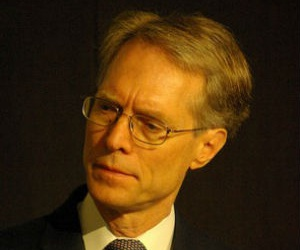Greg Thielmann grew up in Newton and worked for more than 30 years on nuclear weapons issues in the Office of Management and Budget, the U.S. Foreign Service, and the Senate Intelligence Committee. He currently serves as a board member of the Arms Control Association. -promoted by Laura Belin
When I was growing up in central Iowa during the Cold War, I sometimes found myself headed west on Interstate 80, imagining the way nuclear war would be likely to arrive in Iowa – a series of Soviet nuclear ground bursts in Omaha to destroy Strategic Air Command Headquarters, bathing Iowa in a heavy dose of radioactive fallout.
Now the Cold War is over, but not the nuclear threat. The Trump administration has abandoned the anti-nuclear deal with Iran and six other states. President Trump’s efforts to achieve nuclear disarmament on the Korean peninsula have fizzled. The U.S. has pulled out of the Intermediate-Range Nuclear Forces Treaty with Russia and is dithering over Moscow’s offer to extend the New Strategic Arms Reduction Treaty (New START), the only remaining limit on the world’s largest nuclear arsenals.
Meanwhile, the Trump administration proposes spending trillions of dollars to build new strategic weapons.
Seventy-five years after the bombing of Hiroshima and Nagasaki, nuclear weapons are still very much with us. Yet they have been conspicuously absent from discussions in the Democratic presidential debates. Nuclear weapons have simply not received the attention they merit. Just as the candidates have plans for health care, education, climate change, and immigration, they need one for reducing nuclear threats. And they need it now.
The next president of the United States must lay out a nuclear agenda that addresses these three primary questions:
Should the president of the United States have the unilateral power to start a nuclear war at any time, for any reason, with no oversight?
President Trump’s impulsive and erratic behavior has led many to question whether any president should have, as is current policy, unlimited authority to launch nuclear weapons first. We have had multiple false alarms of nuclear attacks over the years, and the reality that our warning systems are vulnerable to cyberattack now makes false alarms more likely, not less.
An important way to reduce the chances of blundering into nuclear war by mistake is to prohibit the president from using such weapons first. Retaliation would still be allowed, but there is no need for a U.S. president ever to initiate nuclear war. The purpose of U.S. nuclear weapons should be to prevent nuclear war, not start one.
How do we stop a new nuclear arms race?
President Trump has systematically attacked nuclear arms control from his first days in office, while simultaneously promoting new, expensive, and dangerous nuclear weapons. In so doing, the Trump administration is increasing the role of nuclear weapons and exacerbating nuclear risks around the world.
The next president must extend, build on, and broaden New START. Negotiations on a follow-on agreement should seek to: significantly lower levels of U.S. and Russian nuclear weapons — both strategic and tactical; freeze the size of third-party arsenals; establish an explicit treaty relationship between strategic defense and offense; and maximize transparency.
How can we use diplomacy to reduce threats from Iran and North Korea?
A war with even a non-nuclear Iran would greatly exceed the debacle created by invading Iraq in 2003. A war with a nuclear-armed North Korea would be far worse still. Both regimes pose perilous challenges to the global efforts to stop the spread of the bomb.
The next president, whoever she or he might be, will have to find ways to resolve our differences diplomatically, searching for formulas that offer advantages to both sides. There is no viable military solution to these conflicts.
Of course, nuclear policy has not been entirely absent from the campaign trail: voters, questionnaires, and a few debate questions have sporadically pressed candidates on their policies. But while some contenders have put out planks on specific nuclear issues, none of the major candidates have laid out a holistic nuclear weapons agenda.
As the Democratic candidates share their visions for the country in the days ahead, we must hear more about avoiding the most acute danger we all face: the risk of nuclear war.
Top photo of Greg Thielmann provided by the author and published with permission.
Editor’s note: Bleeding Heartland welcomes guest posts related to the Iowa caucuses. Please read these guidelines and contact Laura Belin if you are interested in writing.

